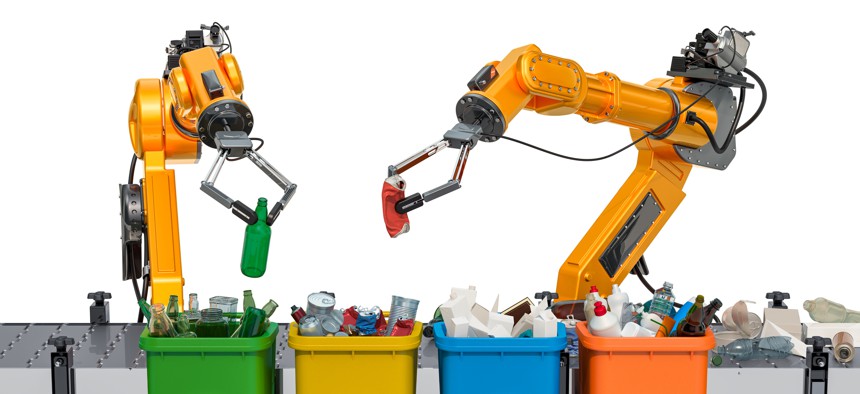AI-enabled robots may increase recycling, workplace safety

Automating the recycling sorting process can increase waste management efficiency and play a valuable role in reducing environmental contamination.
Sci-fi got it wrong—robots don’t want to kill us, they want to sort through our trash.
At least that’s the goal of a recycling robot slated to start work this fall at a materials recovery facility in Ann Arbor, the Michigan Department of Environment, Great Lakes, and Energy (EGLE) announced last month.
Machinex Technologies’ SamurAI uses artificial intelligence to identify specific types of materials such as polypropylene plastics and remove them from the sorting line with a suction system.
“This advancing technology … is providing real-time data about the quality of the material coming in to a recycling facility,” EGLE recycling specialist Matt Flechter said. For instance, if artificial intelligence-based cameras can identify and sort nonrecyclabes such as dirty diapers or food waste on the conveyor belt, officials have an opportunity to adjust their education campaigns to encourage cleaner recycling practices. Robots in recycling may also protect workers from hazardous materials by removing items such as hypodermic needles, he said.
Automating the recycling process has potential to reap financial benefits for the community, according to Recycle Ann Arbor, a nonprofit dedicated to developing and implementing zero-waste initiatives. The organization projects SamurAI to ring in $72,000 annually for Washtenaw County municipality partners from the sale of recycled plastics.
Recycle Ann Arbor acquired SamurAI with $200,000 from EGLE and an additional $186,000 from The Recycling Partnership, an organization that supports communities’ recycling programs. It will be implemented at an Ann Arbor-based materials recovery facility that opened in 2021.
Miami, meanwhile, is taking a different tactic to improve recycling efficiency: squelching contamination at the source. A team of researchers at the University of Miami’s Institute for Data Science and Computing has developed an application that uses machine learning and computer vision to identify various waste materials. The system would allow for Florida residents to scan an item and get photos and descriptions of what products are recyclable in which county and what receptacle to reduce excessive waste. The app is slated to launch in the next few months, collaborator and software architect Lamar Giggetts said.
By enabling cleaner waste habits at the consumer level, “less contamination at the government level … could make life easier,” said Amin Sarafraz, a research assistant professor at the university’s Department of Civil and Architectural Engineering. Intelligent recycling “definitely can make the whole process faster and bring more value, whether it’s financial or nonfinancial, to government as well as the communities,” he said.
State and local governments that invest in innovative solutions open the doors for a circular economy and job creation, Flechter said. “The way … to do that is by investing in technology to help governments operate more efficiently,” he said.






